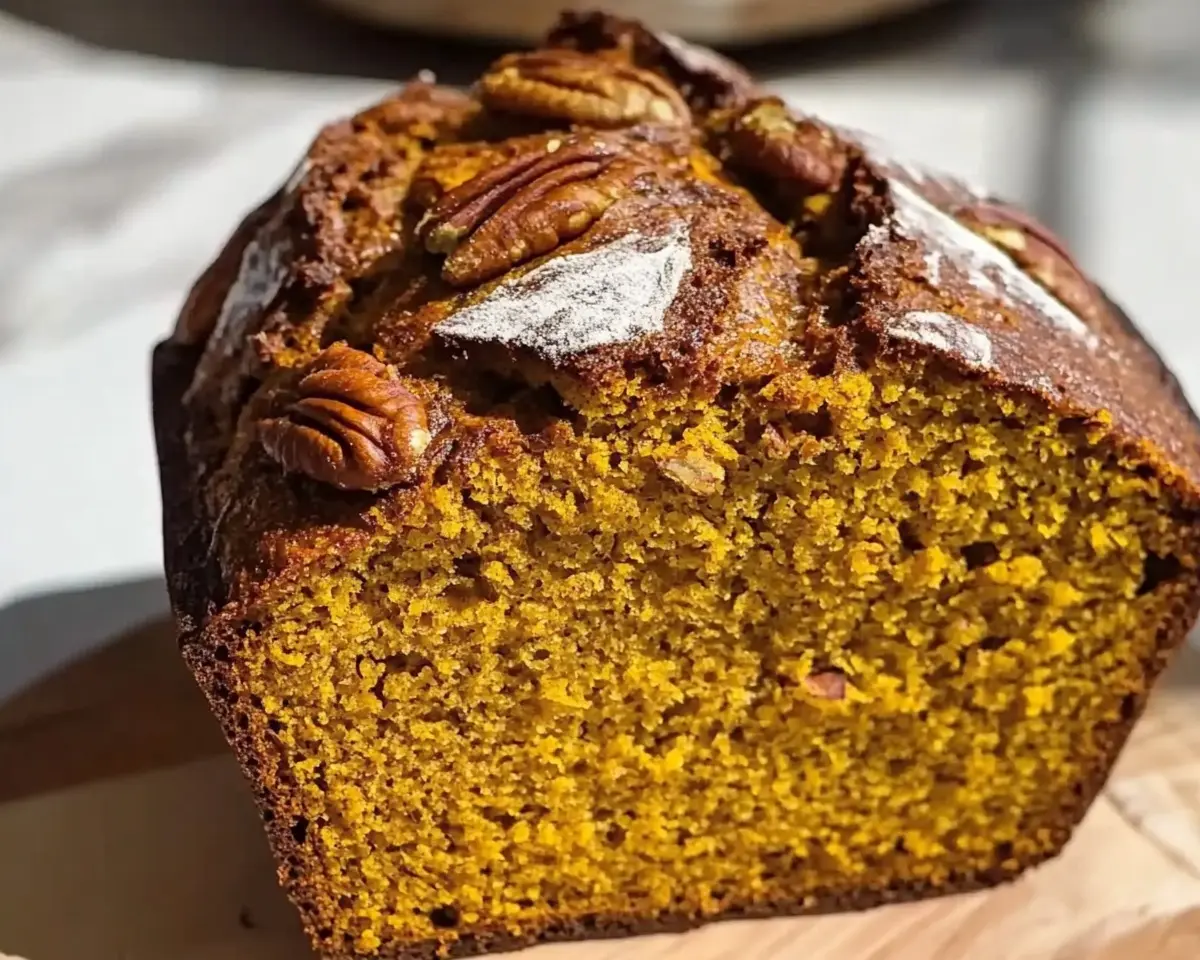Sweet Sourdough Pumpkin Bread with cinnamon and pecans – authentic fall flavors meet artisan baking. Easy recipe with step-by-step guide.
Well, let me tell you about the morning that changed my entire perspective on fall baking. Picture this: October air crisp enough to make you reach for your favorite sweater, and there I was, staring at a failed pumpkin bread that resembled more of a doorstop than breakfast. My grandmother’s traditional recipe had let me down again, and honestly, I was ready to give up on pumpkin baking altogether.
Then inspiration struck like lightning during a visit to Vermont’s countryside. A local baker shared her secret – combining the tangy complexity of sourdough with autumn’s sweetest gift: roasted pumpkin. That first bite transported me instantly. The bread sang with layers of flavor – earthy pumpkin, warm cinnamon, crunchy pecans, all wrapped in that distinctive sourdough tang that makes your taste buds dance.
After countless kitchen experiments and more than a few burnt loaves (oops!), I’ve perfected this sweet sourdough pumpkin bread recipe. Moreover, it captures everything magical about fall mornings – that perfect balance between comfort and sophistication. This isn’t your typical quick bread either. Instead, it’s a slow-fermented masterpiece that develops incredible depth over time.
You know what makes this recipe truly special? It transforms ordinary ingredients into something extraordinary through the ancient art of sourdough fermentation. Furthermore, the addition of maple syrup and a hint of turmeric creates a golden loaf that looks as stunning as it tastes.
Table of Contents
What Makes This Pumpkin Sourdough Bread Recipe Extraordinary
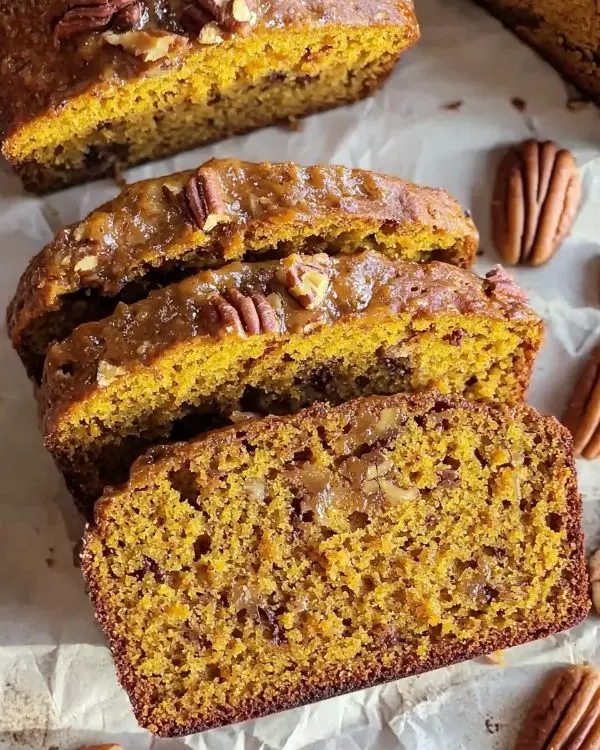
This sweet sourdough pumpkin bread stands apart from traditional pumpkin bread recipes for several compelling reasons. First, the long fermentation process develops complex flavors that simply can’t be rushed. Additionally, the roasted pumpkin (not canned) provides authentic autumn taste that commercial purees lack.
The secret lies in timing and technique. Unlike quick breads that rely solely on baking powder, this recipe harnesses wild yeast from your sourdough starter. Consequently, you get incredible texture – tender crumb with just enough chew to satisfy. The fermentation also breaks down gluten naturally, making it easier to digest.
Man, oh man, the aroma alone will have your neighbors knocking on your door! The combination of cinnamon and pecans creates layers of flavor that unfold with each bite. Furthermore, the maple syrup adds subtle sweetness without overwhelming the pumpkin’s natural earthiness.
Pumpkin Sourdough Bread Ingredients Table
| Dough Ingredients | US Measure | Metric | Notes |
|---|---|---|---|
| Sourdough Starter (fed) | ⅓ cup + 2 tbsp | 100g | Should be bubbly and active |
| Roasted Pumpkin | ¾ cup + 1 tbsp | 200g | Fresh roasted preferred |
| White Bread Flour | 4 cups | 500g | King Arthur recommended |
| Warm Water | ¾ cup | 180g | 80-90°F optimal |
| Maple Syrup | 2 tbsp | 30g | Pure grade A |
| Salt | 2 tsp | 10g | Fine sea salt |
| Turmeric | Pinch | Pinch | For golden color |
| Cinnamon | Pinch | Pinch | Ceylon preferred |
| Filling Ingredients | US Measure | Metric | Notes |
|---|---|---|---|
| Pumpkin Puree | 3 tbsp + 1 tsp | 50g | Can use canned |
| Brown Sugar | ½ cup | 100g | Packed measurement |
| Cinnamon | 1 tsp | 1 tsp | Ground cinnamon |
| All-Purpose Flour | 1 tbsp | 15g | For binding |
| Nutmeg | Pinch | Pinch | Freshly grated best |
| Crushed Pecans | ½ cup | 60g | Toasted recommended |
Shopping Tips for Perfect Results
When shopping at your local grocery store, focus on quality ingredients that will elevate your pumpkin sour dough bread recipe. Look for sugar pumpkins (also called pie pumpkins) in the produce section – they’re smaller and sweeter than carving pumpkins. Additionally, choose pecans from the refrigerated section for maximum freshness.
For the sourdough starter, ensure it’s been fed 4-12 hours before baking. The starter should double in size and smell pleasantly tangy. If you’re new to sourdough, many health food stores now sell active starters.
Essential Ingredient Substitutions
| Original | Substitution | Notes |
|---|---|---|
| Fresh Pumpkin | Canned Pumpkin Puree | Use ¾ the amount |
| Maple Syrup | Honey or Brown Sugar | Adjust liquid accordingly |
| Pecans | Walnuts or Pumpkin Seeds | Toast for best flavor |
| White Bread Flour | All-Purpose Flour | May need extra water |
Equipment and Preparation Steps
Essential Equipment
You’ll need a large mixing bowl, bench scraper, kitchen scale (highly recommended), spray bottle, proofing basket or bowl, and a Dutch oven with lid. Don’t have a proofing basket? No problem – a bowl lined with a well-floured kitchen towel works perfectly.
The Dutch oven is crucial for achieving that perfect crust. It creates steam during the initial baking phase, then allows for browning once the lid is removed. If you don’t own one, a covered casserole dish can substitute, though results may vary slightly.
Step-by-Step Preparation Guide
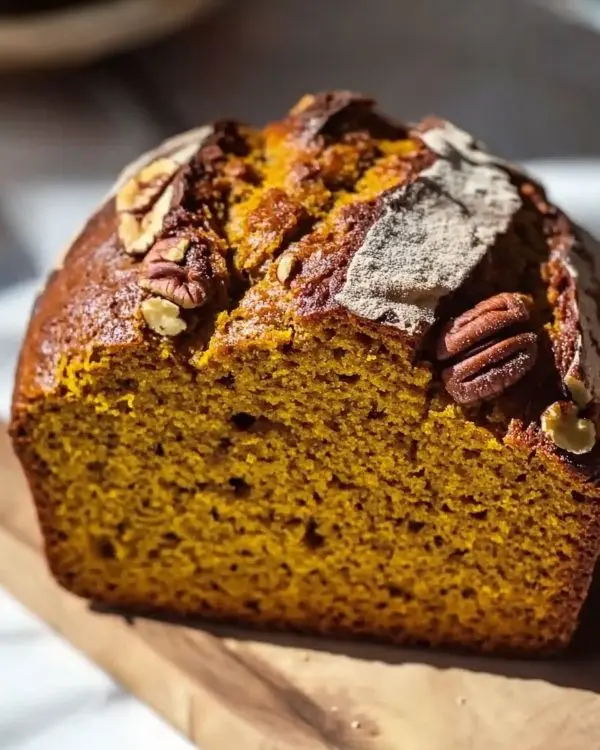
Morning Preparation (Start Before 9 AM)
Step 1: Create the Base Dough Begin by combining your active sourdough starter with roasted pumpkin in a large bowl. Next, add the flour, warm water, maple syrup, turmeric, and cinnamon. Mix until a shaggy dough forms – it won’t look pretty yet, but that’s perfectly normal.
Knead the ingredients together until a uniform dough ball develops. This takes about 5-7 minutes of gentle kneading. The dough will be slightly sticky due to the pumpkin content, so don’t add extra flour yet. Let the dough rest for 45 minutes covered with a damp towel.
Step 2: Salt Integration After the initial rest, spray your hands and the dough with water. Sprinkle salt evenly over the surface, then knead it thoroughly into the dough. This delayed salt addition (called autolyse) improves gluten development. Rest another 30 minutes.
First Stretch and Fold Sequence
Step 3: Initial Stretch and Fold Mist your clean countertop with water – this prevents sticking without adding flour. With wet hands, gently turn the dough onto the damp surface. Rinse your bowl and leave it slightly wet.
Perform the stretch and fold technique: stretch the top portion over the bottom, then each side over the center. Place the dough back in the bowl seam-side down. Rest 30 minutes while you prepare the filling.
Step 4: Prepare the Sweet Filling Meanwhile, combine pumpkin puree, brown sugar, cinnamon, flour, nutmeg, and crushed pecans. Mix until well incorporated. This filling adds incredible flavor layers and creates beautiful swirls throughout your finished loaf.
Incorporating the Filling
Step 5: Adding the Pumpkin Pecan Filling Here’s where things get exciting! Turn the dough onto your dampened counter again. Gently stretch it into a rectangle – be patient and avoid tearing the dough. Spread the filling mixture evenly across the surface.
Now comes the tricky part. Fold the dough over the filling, then knead gently until the pecans distribute evenly. The dough will become sticky, and some pecans might poke through – that’s completely normal. Use your bench scraper to keep everything together.
Let me tell you, this step separates good bakers from great ones. Last fall, I rushed this process and ended up with uneven distribution. Take your time here – the results are worth it.
Continued Fermentation
Step 6-8: Additional Stretch and Fold Cycles Perform two more stretch and fold cycles with 1-2 hour rests between each. Watch for dough development – it should become smoother and more elastic with each cycle. The timing depends on your kitchen temperature, so trust the dough, not just the clock.
During warmer months, fermentation happens faster. In winter, you might need extra time. The dough is ready when it feels slightly jiggly and has increased in size by about 50%.
Shaping Phase
Step 9: Pre-Shaping Clean and dry your counter, then dust it lightly with flour. Flip the dough seam-side up and perform one final stretch and fold. Flip it over and tuck the edges under to create a round shape. Cover with a floured towel and rest 1 hour.
Step 10: Final Shaping This is your moment to create a beautiful loaf! Flip the dough seam-side up again, stretch gently, and fold. Turn it over and shape into your desired form – round boules work beautifully for this recipe.
Transfer to a well-floured proofing basket or bowl. Cover and refrigerate 8-12 hours. This cold fermentation develops incredible flavor complexity that you simply can’t achieve with quick rises.
Baking Day
Step 11: Prepare for Baking Preheat your Dutch oven with lid at 450°F. This takes about 45 minutes – don’t rush this step. The pot needs to be thoroughly heated for optimal oven spring.
Step 12: Score and Bake Turn your dough onto parchment paper seam-side down. Score decoratively with a sharp knife or razor blade. Using the parchment corners, lower the dough into your hot Dutch oven.
Bake covered for 35 minutes, then remove the lid and continue baking 20-30 minutes until deep golden brown. The internal temperature should reach 205-210°F for perfect doneness.
Expert Tips and Variations for the Perfect Pumpkin Sourdough Bread
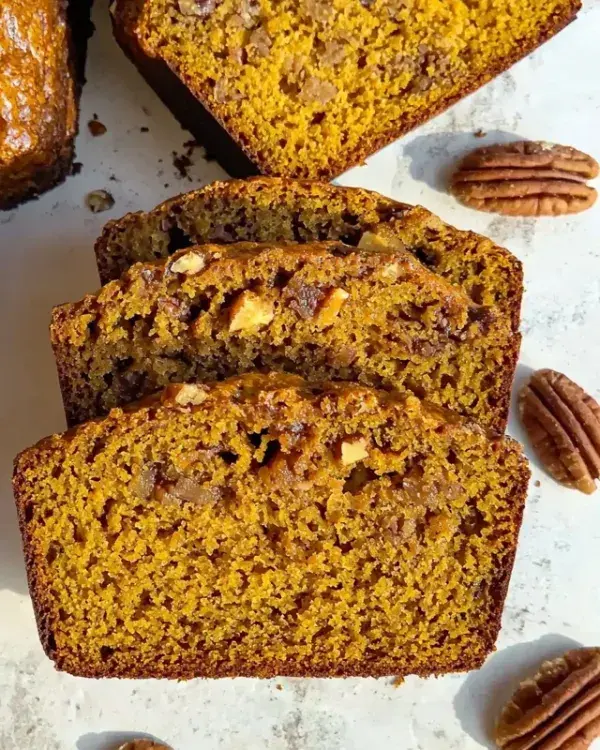
Pro Tips for Success
Temperature control is absolutely critical for sourdough success. Use an instant-read thermometer to check your water temperature – too hot kills the yeast, too cold slows fermentation. Additionally, invest in a kitchen scale for consistent results every time.
Here’s a mistake I learned the hard way: never skip the overnight cold fermentation. During my early experiments, I tried rushing this step and ended up with dense, poorly developed bread. The cold rest allows enzymes to work their magic, creating complex flavors impossible to achieve otherwise.
Humidity matters too. If your kitchen is dry, cover your dough with damp towels rather than plastic wrap. This prevents skin formation while maintaining proper moisture levels.
Pumpkin Sourdough Bread Creative Seasonal Variations
Thanksgiving Spice Blend: Add ¼ teaspoon each of cardamom, allspice, and ginger to the dough for a holiday twist. This variation pairs beautifully with cranberry desserts.
Chocolate Chip Pumpkin: Replace pecans with dark chocolate chips for a dessert-style loaf. Kids absolutely love this version, and it makes fantastic French toast.
Savory Herb Version: Omit the sweet filling and add fresh sage, rosemary, and cracked black pepper instead. This creates an amazing accompaniment to autumn soups.
Mabon Bread Inspiration: For those celebrating the autumn equinox, add dried cranberries and orange zest to honor traditional Mabon bread recipes.
Storage and Make-Ahead Instructions
| Storage Method | Duration | Quality Notes |
|---|---|---|
| Room Temperature | 3-4 days | Wrap in beeswax cloth |
| Refrigerator | 1 week | Slice before storing |
| Freezer (whole) | 3 months | Double-wrap in plastic |
| Freezer (sliced) | 2 months | Individual portions |
For make-ahead convenience, shape the loaf and refrigerate up to 24 hours before baking. You can also freeze the shaped dough – just add an extra hour to the final proof when ready to bake.
Perfect Pairings
This sweet sourdough pumpkin bread shines alongside apple crisp for ultimate fall comfort. Additionally, it makes exceptional sandwiches with cream cheese and turkey for lunch.
For beverages, pair with spiced chai, maple coffee, or mulled apple cider. The bread’s complexity stands up beautifully to bold flavors while complementing subtle ones.
Pumpkin Sourdough Bread FAQs
Can you mix cinnamon into sourdough?
Absolutely! Cinnamon integrates beautifully into sourdough dough without affecting fermentation. Add it during the initial mixing stage for even distribution throughout the loaf.
Can you add pumpkin to sourdough?
Yes, pumpkin adds moisture and natural sweetness to sourdough bread. Roasted pumpkin works better than canned because it has less water content, preventing overly sticky dough.
What is the biggest mistake you can make with your sourdough starter?
The biggest mistake is using an inactive or unfed starter. Your starter should double in size within 4-8 hours of feeding and smell pleasantly tangy, not sour or vinegary.
What is the 3 ingredient sourdough?
Traditional 3-ingredient sourdough contains only starter, flour, and salt. However, this pumpkin version adds complexity with additional ingredients while maintaining sourdough’s characteristic tang.
Does cinnamon affect sourdough rise?
Cinnamon in small amounts doesn’t significantly impact rise time. However, large quantities can slow fermentation slightly due to its antimicrobial properties, so use moderately.
Bringing It All Together
As autumn leaves paint the landscape in brilliant oranges and golds, there’s nothing quite like the satisfaction of pulling a golden loaf of sweet sourdough pumpkin bread from your oven. The aroma fills every corner of your home, creating memories that last long after the last crumb disappears.
This recipe represents more than just bread – it’s a celebration of seasonal abundance and traditional techniques passed down through generations. Each slice tells the story of patient fermentation, quality ingredients, and the magic that happens when ancient grains meet autumn’s harvest.
Whether you’re serving this alongside holiday cookies or enjoying it as a quiet morning treat, this bread brings people together. The combination of tangy sourdough, sweet pumpkin, aromatic cinnamon, and crunchy pecans creates harmony that speaks to our deepest comfort food cravings.
Make this recipe your own by experimenting with different spice combinations or add-ins. Share your creations on social media and tag us – we love seeing how this recipe evolves in kitchens across America. After all, the best recipes are those that adapt to your family’s preferences while maintaining their essential character.
So grab your apron, feed that starter, and get ready to create something truly special. Your kitchen will smell like autumn dreams, and your family will thank you for bringing this incredible sweet sourdough pumpkin bread into their lives.
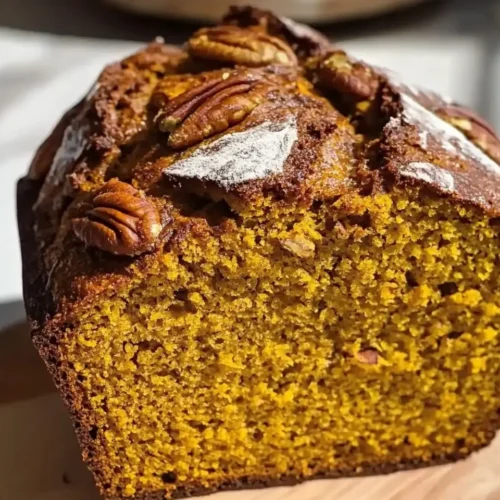
Sweet Sourdough Pumpkin Bread With Cinnamon and Pecans
Equipment
- Large mixing bowl
- Bench scraper
- Kitchen scale
- Spray bottle
- Proofing basket
- Dutch oven with lid
- Parchment paper
- Sharp knife or scoring tool
Ingredients
Dough
- 100 g Sourdough Starter fed and bubbly
- 200 g Roasted Pumpkin
- 500 g White Bread Flour
- 180 g Warm Water
- 30 g Maple Syrup
- 10 g Salt
- 1 pinch Turmeric for color
- 1 pinch Cinnamon
Filling
- 50 g Pumpkin Puree
- 100 g Brown Sugar
- 1 tsp Cinnamon
- 15 g Flour
- 1 pinch Nutmeg
- 60 g Crushed Pecans
Instructions
- In a large bowl, combine the starter, pumpkin, flour, water, maple syrup, turmeric, and cinnamon. Knead the ingredients together until a uniform dough ball forms. Let the dough rest for 45 minutes.
- Wet your hands, and spray the dough with your water bottle. Sprinkle the salt over the dough, then knead it into the dough. Let rest for 30 more minutes.
- Using a spray bottle filled with water, mist your clean countertop. Wet your hands and wet the top of the dough ball with the spray bottle. Turn the dough out onto the wet counter surface. Scrape out the bowl and rinse the inside of the bowl really well. Leave the bowl wet.
- Stretch and fold the dough. Stretch the top of the dough over the bottom, side over side, and bottom over top. Place the dough back in the bowl with the seam side down. Let the dough rest for 30 minutes.
- While the dough rests, mix the filling ingredients: pumpkin puree, brown sugar, cinnamon, flour, nutmeg, and crushed pecans.
- Turn the dough out onto the wet counter surface. Stretch out the dough into a rectangle, but be gentle and do not break or tear it. Spread the mixed filling over the dough.
- Fold the ingredients into the dough by folding the top of the dough over the bottom, side over side, and bottom over top. Then knead the dough again until it is mostly smooth and the pecans are evenly distributed through the dough. Place the dough back in the bowl with the seam side down. Let the dough rest for 1 to 2 hours.
- Perform a second stretch and fold. Stretch the top of the dough over the bottom, side over side, and bottom over top. Place the dough back in the bowl with the seam side down. Let the dough rest for 2 hours.
- Perform a third stretch and fold. Stretch the top of the dough over the bottom, side over side, and bottom over top. Place the dough back in the bowl with the seam side down. Let the dough rest for 1 to 2 hours.
- Clean and dry the counter surface. Sprinkle some flour on the surface and coat your hands in flour. Gently flip the dough out onto the floured surface so that it is seam side up.
- Pre-shape: Gently stretch out the dough, and fold it again. Fold side over side and top over bottom. Then flip the dough over so that the seam side is down on the counter. Tuck under any parts of the dough you need to form a nice circular shape. Cover with a tea towel and let rest for 1 hour.
- Final shaping: Flip the dough over so that the seam side is up again. Gently stretch out the dough, and fold it again. Flip the dough over so that the seam side is down. Tuck under any parts to form a nice circular loaf shape.
- Coat a proofing basket with flour generously. Flour your hands and swiftly pick up and flip your dough into the basket, smooth side down, seam side up. Cover and place in the fridge overnight for 8-12 hours.
- After 8-12 hours in the fridge, preheat your Dutch oven with the lid in your oven at 450°F.
- Carefully remove your Dutch oven and place the lid to the side. Cut a large square of parchment paper and place it on the counter. Turn your dough out onto the paper so that the seam side is down and touching the parchment paper.
- Score the dough using a very sharp knife or a scoring tool. Picking up all four corners of the parchment paper, move your dough into the Dutch oven.
- Place the lid on the Dutch oven and bake at 450°F for 35 minutes. After baking covered, remove the lid and bake for another 20-30 minutes at 450°F.
- Remove your finished loaf from the Dutch oven and allow it to cool for at least 1 hour before slicing.

